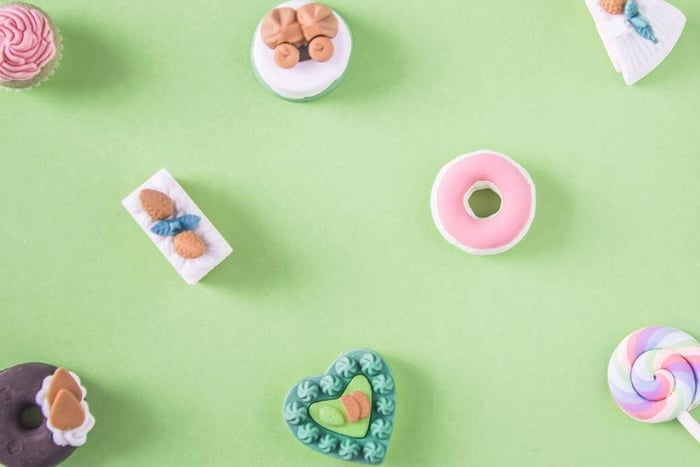Sugar and your body
Eating sugar makes us feel good and gives us a high. It releases the feel good hormones, gives us an energy boost and also improves our mood (1). Anyone who has gone on a fast knows how much sugar can uplift one’s mood and energy. When taken in excess however, sugar can also trigger certain behaviours in the body, with consequences to one’s health, even if relatively minor.
Sugar increases androgen activity and acne
When we consume high GI foods such as refined flour, cakes or chocolates, the pancreas releases insulin to digest sugar and carbohydrates into glucose. Consumption of large amounts of sugar can cause spikes in insulin levels. Overtime, this may reduce our insulin sensitivity, developing a resistance.
Studies show that insulin resistance has been linked to inflammation and sebum production (2)(3). Since insulin increases androgen activity leading to oily skin(4)(5), eating sugary food appears to be one of the potential causes of acne. The result of a high sugar diet is a perfect breeding ground for bacteria and acne (6).
- https://www.psychologytoday.com/us/blog/the-mindful-self-express/201302/why-our-brains-love-sugar-and-why-our-bodies-dont
- https://www.jci.org/articles/view/96139
- https://www.ncbi.nlm.nih.gov/pmc/articles/PMC1483173/
- https://www.ncbi.nlm.nih.gov/pmc/articles/PMC5929972/
- https://www.ncbi.nlm.nih.gov/pmc/articles/PMC5318522/
- https://www.ncbi.nlm.nih.gov/pubmed/15556719/
Eating a balanced diet to reverse acne
What this all means is that we need to relook at our daily sugar intake and become conscious of the food we consume. Being aware of how our body reacts is the first step to taking control of our diet for clear skin. Of course we are not talking about cutting sugar totally. Some sugar is okay for a regular, healthy individual. Balancing one’s sugar intake in relation to other types of food we consume, is the shift that we want to make for a healthier life.
Awareness of the food we consume
Here’s where we get to learn how to practise food awareness. Check the label and look at the sugar content. Most drinks that are seemingly healthy, such as orange juice, contain high levels of sugar. Instead, eat the fruit as it contains fibre which helps to improve your gut and slow down glucose absorption. Become aware of how your body reacts to the increase in sugar. Do you feel more energetic and then have a low mood shortly after? Or do you feel sustained? The good news is for most of us, a shift in diet is all it takes to manage our sugar intake.
Eat adequate fats and proteins
Protein is the building block of our body. It breaks down to amino acids, some of which are essential, to repair and heal our muscles and tissues. It also helps to support collagen production--one of the important building blocks for healthy skin. Fish, pork, chicken and beef are all good sources of animal protein and should be included in your daily diet. How much to eat depends on your body weight. For an average person around 50 - 60kg, eat around 75 - 100g of protein daily for best benefits.
Oils are very nourishing for the skin too and should be consumed daily. The low-fat diet fad has been shown to have negative consequences for health and is now making way for healthy fats. Consume foods such as avocado, coconuts, olives that contain nourishing fats. Coconut fats has a low smoke point and is good for cooking. Coconut oils in the form of MCT oils are great for using in salads too!
Consume healthy sources of carbohydrates and fibre
Since sugar increases insulin which causes excess sebum and other big acne triggers, eating blood glucose balancing meals that are not too carb heavy is an ideal diet for clear skin. A low GI diet has been shown to help reverse acne due to the reduction in inflammatory responses (7)(8)(9).
The whole idea is to consume unrefined and whole grains that are unprocessed as they are are higher in nutrients and fibre. The fibre in the unrefined grains slow down digestion and thus absorption into the blood stream is regulated.
- Consume whole grains such as brown rice, buckwheat, oats. Roughly 80 - 100g per meal is ideal.
- Consume less of refined grains such as white rice, white bread, corn. If buying economy rice at a hawker store, request for brown rice. Otherwise, ask for less white rice.
- Most definitely, after everything we’ve talked about, avoid high GI foods such as cakes, chocolates, Starbucks latte, breakfast cereals frosted with sugar etc. They may taste good and make us happy but they don’t serve our health or skin in the long run.
Acne is a stressful and also pesky skin condition that is frustrating. With little changes in the diet, together with the right skincare products, we can be on the road of truly healing acne from the inside out. Those old wives tales of “don’t eat sugar” contain some wisdom and gems after all.

